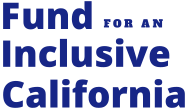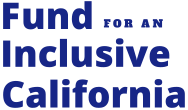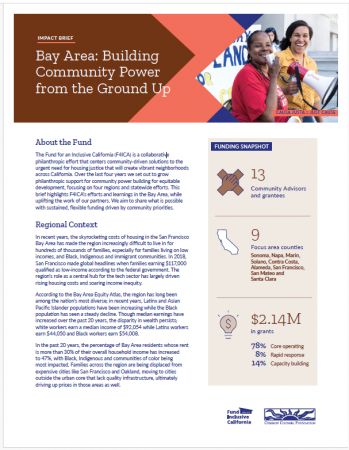Fund for an Inclusive California Boosts Power Building Efforts for Housing Justice Across the State with $1.7 Million in Grants
December 12, 2024 (Oakland, Calif.) — Common Counsel Foundation’s (CCF) Fund for an Inclusive California announces $1.7 million in grants to grow the influence and impact of small and emerging grassroots power building organizations advancing a housing justice agenda throughout California. This round of grants range from $25,000–$100,000 and contribute to the Fund’s $13.5 million total in funding for community-led housing solutions since 2018. The grants reaffirm the Fund’s commitment to supporting the leadership and influence of directly impacted communities on the decisions and policies that ensure safe, affordable, and stable housing for everyone.
“Housing justice cannot be achieved without building political power. CCF is reaffirming our commitment to this work and aim to embody what it means to cede power, take the lead from movement partners, and align resources to advance a bold vision for housing justice,” shares Jazmin Segura, director of Housing Justice Initiatives at Common Counsel Foundation. “This work is more critical now than ever before, and CCF is doubling down on funding power-building at the local and statewide levels.”
The Fund is led by a unique co-governance structure made up of both community leaders and funders. Since its inception, the Fund for an Inclusive California has prioritized accountability to its community partners through shared decision making and developing funding strategies in consultation with those partners to nurture, strengthen, and expand local and regional power across the state.
“The Fund’s partnerships and grantmaking exemplify funding that is guided by deep-rooted relationships, which aligns with and elevates the solutions created by people who have lived through these challenges,” says Diana Amparo Jiménez, Program Officer, Housing Justice at Weingart Foundation and member of the Fund’s co-governance body. “This is the powerful role we can play as funders, supporting their visionary solutions that ensure a more equitable and just society for generations to come.”
This $1.7 million provides vital funding for organizations in the Central Valley and Inland Region — areas confronting some of the state’s most challenging housing issues — along with the Bay Area, Los Angeles, and statewide organizations. Groups funded are advancing critical efforts, including long-term visionary strategies, such as taking land out of the speculative market, increasing the voting power of young Black, Indigenous, and people of color across the state on housing issues, advocating for local and state policies that protect the rights of tenants, and engaging low-income Californians to curtail the abuses of corporate landlords.
“Our communities face mounting challenges in securing a place to call home, and keeping it amid the pressure of corporate investors,” shares Pastor Curtis, executive director of Faith in the Valley, a long-standing partner of the Fund. “Despite these hurdles, we celebrate each hard-fought victory in securing renter protections for our communities. As we look ahead to a new year and the federal threats that will impact working people, we remain steadfast in our commitment to building stronger, more deeply united communities and protecting those most at risk. Together, we are growing our power, day by day, towards our vision of thriving neighborhoods.”
Bay Area
- East Bay Alliance for a Sustainable Economy (EBASE)
- Faith in Action Bay Area
- Housing Rights Committee of San Francisco, Inc.
- North Bay Organizing Project
- Regional Tenant Organizing Network
- Rising Juntos
Central Valley
- California Rural Legal Assistance, Inc. – Community Equity Initiative
- Central Valley Empowerment Alliance
- Fresno BHC
- Faith in the Valley
- Leadership Counsel for Justice and Accountability
- Power California
Inland Region
- ACLU of Southern California
- Congregations Organized for Prophetic Engagement
- Just San Bernardino
- Pueblo Unido Community Development Center
- Starting Over, Inc.
- Time for Change Foundation
- Training Occupational Development Educating Communities (TODEC) Legal Center
- Warehouse Workers Resource Center
Los Angeles
- ACT-LA
- Community Power Collective
- Housing Movement Lab
- InnerCity Struggle
- Koreatown Immigrant Workers Alliance (KIWA)
- LA Voice
- Long Beach Residents Empowered (LiBRE)
- Social Justice Learning Institute (SJLI)
- Strategic Actions for a Just Economy (SAJE)
Statewide
- ACCE Institute
- HousingNow!
- Homes for All California
- California Center for Movement Legal Services
- PICO California – Faith in Action Network
- Tenants Together
For media inquiries, please contact Sabrina Chin, Director of Communications, at [email protected].


